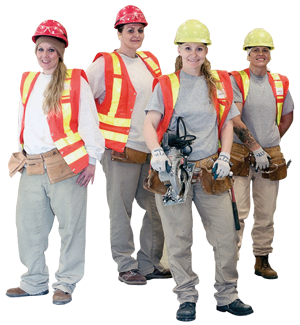Employment Support
Correctional Industries' (CI) work training program is modeled after the real world. Employability and technical skills are developed and applied daily in prison. CI leverages its business strengths as a workforce development program for incarcerated individuals, and has forged a strong relationship with the DOC's Education Program which contracts with the State Board for Community and Technical Colleges. Each facility has a community college program on site. Vocational classes and education support CI and develop employability skills. Completing particular classes puts participants in a good position to transition to industry jobs, such as:
- Accounting Clerk
- AutoCad Drafter
- Carpenter
- Clerk
- CNC Machine Operator
- Computer Operator
- Custodian
- Files Clerk
- Inventory Clerk
- Invoicing Clerk
- Machine Repair
- Maintenance Worker
- Painting/Powder Coating
- ProCad Drafter
- Purchasing Clerk
- Sewing Machine Operator
- Shipping and Receiving
- Welder
Class 2 Jobs
Class II industries are businesses owned and operated by the state that provide job training and work experience to individuals who are incarcerated. Each class II job is categorized according to its occupational definition using the Federal Standard Occupational Classification (SOC) system. Information in this system is useful to CI’s Workforce Development staff and to releasing jobseekers who are working on their resumes or are searching for industry specific education and training requirements. To further refine these classifications, similar job duties are combined to form major, minor, and broad categories of related fields or “Career Clusters.” Additionally, each SOC code is identified as one of five "Job Zones." These zones give a reasonable expectation to the amount of pay, training, education and or related experience needed for entry into a particular field.
Recognizing Achievement
After 1,500 hours in one job classification, incarcerated workers who have demonstrated a high level of proficiency in their field of work may be nominated by their supervisor for a Certificate of Proficiency. Based on established SOC criteria, these certificates are issued in recognition of a worker's hard work and dedication and can be used as part of their work expereince portfolio. Additionally, incarcerated individuals trained through CI's TRAC Program or by working with various organizations can also earn specialized industry accredited certificates in areas such as forklift operation, flagging, and laundry management.


TRAC Program
Correctional Industries offers a competitive 16-week pre-apprenticeship program in the building trades at Washington Corrections Center for Women (WCCW), and at Mission Creek Corrections Center for Women (MCCCW). This Trades Related Apprenticeship Coaching (TRAC) program provides students with hands-on training specific to construction craft laborers, plasterers, cement masons, carpenters, and ironworkers – allowing students the ability to earn certificates of accreditation that grant preferred entry into union apprenticeships. TRAC students also work closely with a CI community employment specialist to build their portfolio, document work hours, create a resume, and generate referrals to our sound community partners.
Ultimately, the TRAC program is a preview of what a living wage career looks like in the community. It not only teaches incarcerated women job skills, but also life skills, reliability, the importance of hard work, and how to add value to the workplace. Solidarity Films by Chuck Bolland produced a TRAC Video that document graduates as they reenter the community and pursue union apprenticeships.


Soft Skills


While incarcerated individuals working for CI are gaining real work experience, they may lack the interpersonal skills required to make the positive decision when faced with basic workplace issues. To enhance "soft" skills, CI offers a special 20-hour class called "Makin It Work." The class is designed to help men and women understand what employers are looking for, and to develop the necessary thinking that will help ensure a successful transition into the workforce in the community.
Role Models In The Workplace
CI staff are not only supervisors, but role models that incarcerated individuals can learn from through observation. As part of our soft skills program, CI staff have been offered Cognitive Coaching. This training explores four self-defeating cognitive-behavioral patterns common to participants who are incarcerated and some of the strategies staff can use to effectively counteract them. CI provides an environment for men and women to learn and apply soft-skills by modeling appropriate behavior and encouraging positive interactions in the workplace. CI staff interact with a large number ofincarcerated individuals teaching them at locations throughout the state, instilling in them the confidence for success on the job and in their day-to-day lives.


Mock Interviews
In addition to the on-the-job training that occurs daily at our various operations, Correctional Industries has designed specific experiences to help incarcerated individuals find and keep employment upon release. One example of this effort is based on the federal prison model that brings employers and community organizations inside prison walls to help workers practice their interviewing skills in Mock Interviews. It is CI's goal to organize and conduct these experiences at our institutions annually. Particpants spend weeks preparing for the experience in a workshop that starts with learning about job markets and how to search for a job. The training includes a resume and application module that allows incarcetated individuals to practice communicating their job skills, abilities, qualifications and experiences comfortably during an interview.


Want to get involved in our Mock Interview Fairs? Contact us at 360.725.9100 and request a Workforce Development staff member.
Employers and Community Partners
Employers, human resources consultants, community partners and hiring managers from businesses large and small are invited to participate as interviewers for mock jobs during annual CI Mock Interview experiences at each of our major facilities. These events provide a realistic job application and interview experience to CI workers who will release into the job market in the near future. This is not a forum for filling job openings and the aim is not for visiting employers to provide job offers. Rather the goal is to provide incarcerated individuals an opportunity to receive objective feedback on interviewing from subject matter experts. The employers have an opportunity to give back, dispel myths, and meet a number of skilled, motivated, experienced and talented particiapants who will eventually reenter the community. In making a positive connection with this population, our goal is to have employers learn about the potential of this hidden workforce and consider hiring individuals releasing from prison who meet their hiring needs in the future.
A Successful Reentry
The main purpose of these events is to assist incarcerated individuals with their interview skills. It also helps instill the confidence they need for success outside the walls of prison. Many particiapants say they do not feel confident in finding a job once released, but by the end they feel better prepared to secure employment after discussing their relevant skills, abilities and experience with a mock interview panel. "It was challenging, but very insightful. I learned more about myself in regards to my strengths and weaknesses."
